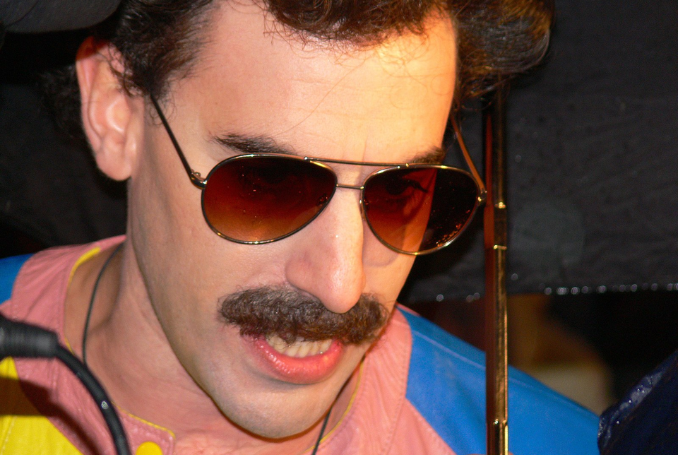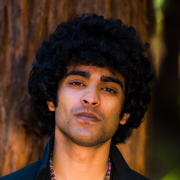
By Karan Singh
Treating every culture besides his own like a costume is central to Sasha Baron Cohen’s widespread allure.
A little over a month after the October 7 attacks by Hamas, which claimed more than 1,000 Israeli lives last year, Jewish-English actor and comedian Sacha Baron Cohen accused TikTok and its participants of “creating the biggest antisemitic movement since the Nazis.”
Whereas he insisted the platform was to blame for spreading misinformation about people of his ethnicity, it has in fact been one of the most effective resources for documenting and transmitting the indiscriminate killing of Palestinian (and now Lebanese) civilians in the aftermath of the aforementioned violence.
Today, the death toll in Gaza continues to rise upward of 40,000.
Criticizing major players in the media space for invigorating lies is necessary, except the 53-year-old funnyman hadn’t a leg to stand on in making the above claim.
There remains a blinding irony to his perturbed comments considering he established himself in the entertainment circuit by fudging Arabs and Muslims while foisting his antics off as harmless jokes during a phase when Islamophobia was and still is proliferating with no end in sight.
“He calls every Muslim in the world untrustworthy, says everybody who identifies as a Muslim is a predator, compares Muslims to animals & the list goes on & on.. Piers both of us know if anybody engaged in that kind of bigotry towards say, Jews. You would not give them airtime.” pic.twitter.com/KVte9qQnHT
— Mukhtar (@I_amMukhtar) October 1, 2024
By the mid-2000s, Cohen was starting to find immense success as Borat Sagdiyev, a deeply humiliating caricature of Kazakhstani folk that depicts them as incestuous and misogynistic antisemites with an insouciance toward rape.
What’s most worrisome about the shtick, however, is the number of people whose impression of the country is still limited to this mischaracterization.
In late October, just as vote centers for the 2024 presidential elections began opening up across the United States, he reprised the character on The Tonight Show Starring Jimmy Fallon while addressing the Democratic and Republican candidates.
“Mr. (Donald) Trump, you say in Ohio people eat the cats and the dogs,” he began, with the host adlibbing snickers between each sentence. “Which restaurant do they serve them at? Can you get me reservation please? In my country, we have KFC: Kazakh Fried Cat. It’s pussy licking good!”
About Kamala Harris, he added: “You are a woman, a person of color and married to a Jew. I advise you not to come to Kazakhstan. You have already made three out of four crimes punishable by death.”
Borat is a problem for the same reasons as Apu from The Simpsons — his farcical behavior and outlook is written off as a satire on American attitudes, creating a purported balance that obscures the Western tradition of painting the Other as unrefined and backward for amusement.
🧵A new investigation by @KitKlarenberg for MintPressNews explores how the rampant Islamophobic stereotypes in the “Borat” movies helped prime Western audiences to accept Israel’s slaughter in Gaza. pic.twitter.com/FnKeWEJZYk
— MintPress News (@MintPressNews) January 31, 2024
Whereas Apu wasn’t deemed offensive at first given the lack of South Asian representation in the 90s, the frugal convenience store owner and his catchphrase “Thank you, come again” has now become not only the most common Indian stereotype but also a widely acceptable one. Hence, the voice actor behind the inflated accent stepped down from the role in 2020.
Cohen, on the other hand, teamed up with Amazon Studios that same year on a multi-million-dollar sequel to his blockbuster Borat film from 2006.
Just like the original, the scenes set in Kazakhstan were shot in a Romanian village and the “Kazakhstanis” were in fact Romanians. After all, it’s tough to believe that any self-respecting Kazakhs would partake in such a revolting portrayal of their culture for the same reasons White folk used to paint their faces in order to demean the Black community with complete flexibility.
Treating every culture besides his own like a costume is central to Cohen’s widespread allure.
Take, for instance, the antisemitic East African despot Admiral General Aladeen from The Dictator or King Julien from the Madagascar films, who for reasons unknown had an Apuesque Indian accent.
Contrarily, when the actor and writer played Israeli anti-terror expert Erran Morad on his Who Is America? series, he made it a point to state that the heedless character was not a member of the Mossad, most likely due to his personal admiration for the intelligence agency as depicted in The Spy.
‘No Revolution within Counter-Revolutionary Party’ – Dr. Stein Speaks to Palestine Chronicle
It’s clear that the Academy Award nominee expects everyone to accept his jokes regardless of how one-dimensional they are.
Funnily enough, he is particularly sensitive when it comes to his own Jewish identity, which he has hidden behind while simultaneously smearing other cultures for decades now. Quite craftily, he has played several antisemitic characters throughout his career to create the illusion of making fun of his own while enlivening stereotypes that allow him more freedom to persist in racist humor.
In one of his early sketches, for example, Borat starts a singalong at a country bar with the lyrics, “Throw the Jew down the well, so my country can be free / You must grab him by his horns, then we have [a] big party.”
In a similar spirit, he was sued for $110 million after interviewing a Palestinian grocer in the Israeli-occupied West Bank for his 2009 mockumentary Brüno. Ultimately settled under undisclosed terms, the lawsuit alleged that the subject was falsely portrayed as a terrorist through manipulative editing.
What the film failed to show was how the title character, a gay fashion journalist from Austria, had a near-death experience in Jerusalem after nearly being stoned to death by Hasidic Jews for mocking their outfits.
Cohen often paints an overdramatized picture of Arab and Muslim antisemitism, likening their hostility to white supremacist sentiments and creating a false proximity between the two that belies the crux of Islamophobia.
This notion alone has allowed even the most “progressive” political forces in the West to continue tormenting the Middle East with little to no accountability.
Constructing a joke around a subject isn’t the same as positioning it at the center and imposing humor on it.
A skilled comedian can make an identity funny without saying that it in itself is funny — the failure (or refusal) to make this distinction can make facetious humor incredibly dangerous, as it has in Sacha Baron Cohen’s case.
(The Palestine Chronicle)

– Karan Singh is an Indian American journalist based in Los Angeles. He contributed this article to the Palestine Chronicle.